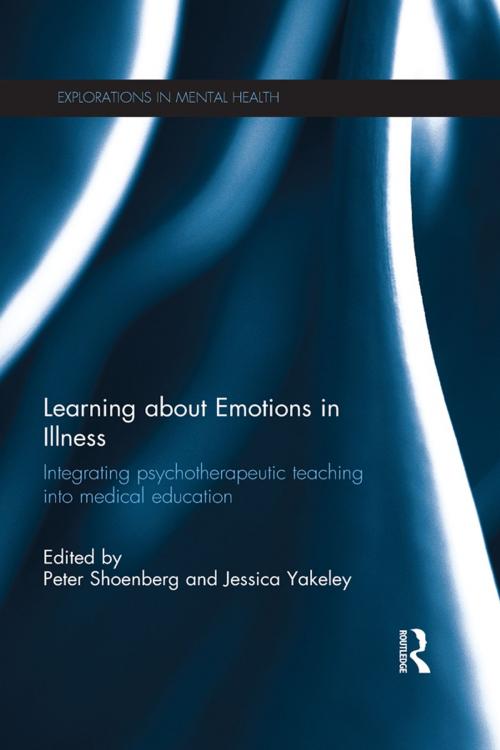Learning about Emotions in Illness
Integrating psychotherapeutic teaching into medical education
Nonfiction, Health & Well Being, Medical, Ailments & Diseases, Mental Health, Psychology| Author: | ISBN: | 9781136157615 | |
| Publisher: | Taylor and Francis | Publication: | March 26, 2014 |
| Imprint: | Routledge | Language: | English |
| Author: | |
| ISBN: | 9781136157615 |
| Publisher: | Taylor and Francis |
| Publication: | March 26, 2014 |
| Imprint: | Routledge |
| Language: | English |
Good communication between the doctor and patient is essential for the patient to establish a trusting relationship with their doctor and to make the best use of the appropriate treatment. Traditional methods for teaching communication skills have focused on simulated clinical situations in which students learn how to improve their communication, with actors playing the part of the patients, rather than from live experiences with patients. Psychodynamic psychotherapy, with its emphasis on learning to reflect on experiences, offers the student the possibility of learning from a real experience with a patient. Such opportunities allow students to learn directly about patients’ emotions, as well as to appreciate their own emotional responses to illness and to communicate better with their patients.
In this book, Peter Shoenberg, Jessica Yakeley, and their contributors who include students and teachers, discuss two different teaching approaches developed at University College London to help medical students understand the role of emotions in illness, communicate more effectively, and gain a deeper understanding of the doctor patient relationship. The benefits of Ball, Wolff and Tredgold’s Student Psychotherapy Scheme are considered alongside Shoenberg and Suckling’s short term student Balint discussion group scheme to provide clear guidance about how psychotherapeutic understanding can be used to inform medical education, with positive results.
At a time when medicine is becoming increasingly technological and there is a growing demand by the public for more psychologically minded doctors, this book will be a key resource for physicians, general practitioners, psychologists, psychiatrists and psychotherapists who are involved in medical teaching and for medical students.
Good communication between the doctor and patient is essential for the patient to establish a trusting relationship with their doctor and to make the best use of the appropriate treatment. Traditional methods for teaching communication skills have focused on simulated clinical situations in which students learn how to improve their communication, with actors playing the part of the patients, rather than from live experiences with patients. Psychodynamic psychotherapy, with its emphasis on learning to reflect on experiences, offers the student the possibility of learning from a real experience with a patient. Such opportunities allow students to learn directly about patients’ emotions, as well as to appreciate their own emotional responses to illness and to communicate better with their patients.
In this book, Peter Shoenberg, Jessica Yakeley, and their contributors who include students and teachers, discuss two different teaching approaches developed at University College London to help medical students understand the role of emotions in illness, communicate more effectively, and gain a deeper understanding of the doctor patient relationship. The benefits of Ball, Wolff and Tredgold’s Student Psychotherapy Scheme are considered alongside Shoenberg and Suckling’s short term student Balint discussion group scheme to provide clear guidance about how psychotherapeutic understanding can be used to inform medical education, with positive results.
At a time when medicine is becoming increasingly technological and there is a growing demand by the public for more psychologically minded doctors, this book will be a key resource for physicians, general practitioners, psychologists, psychiatrists and psychotherapists who are involved in medical teaching and for medical students.















